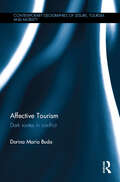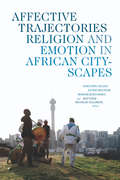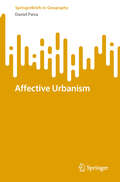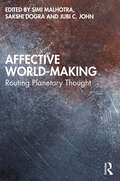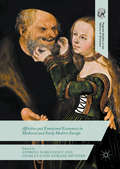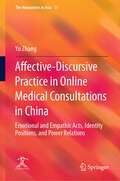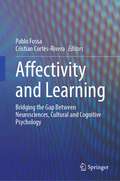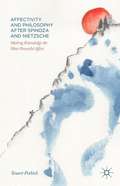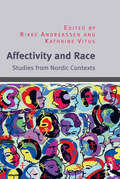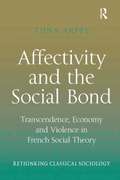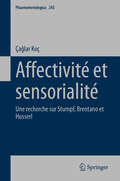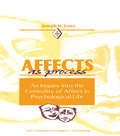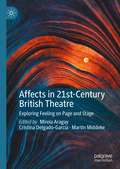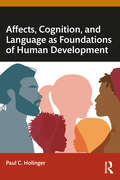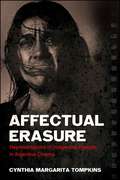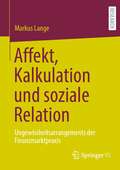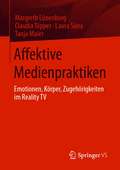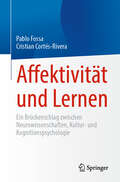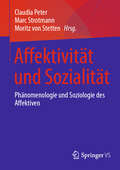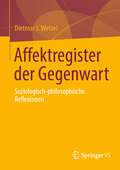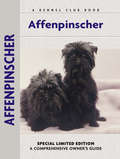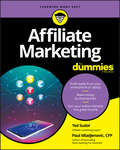- Table View
- List View
Affective Tourism: Dark routes in conflict (Contemporary Geographies of Leisure, Tourism and Mobility)
by Dorina Maria BudaThis book brings together, explores and expands socio-spatial affect, emotion and psychoanalytic drives in tourism for the first time. Affect is to be found in visceral intensities and resonances that circulate around and shape encounters between and amongst tourists, local tourism representatives and places. When affect manifests, it can ‘take shapes’ in the form of emotions such as fun, joy, fear, anger and the like. When it remains a visceral force of latent bodily responses, affect overlaps with drives as expounded in psychoanalysis. The aim of the title, therefore, is to explore how and in what ways affects, emotions and drives are felt and performed in tourism encounters in places of socio-political turmoil such as Jordan, Palestine/Israel, with a detour to Iraq. Affective Tourism is highly innovative as it offers a new way of theorising tourism encounters bringing together, critically examining and expanding three areas of scholarship: affective and emotional geographies, psychoanalytic geographies and dark tourism. It has relevance for tourism industries in places in the proximity of ongoing conflicts as it provides in-depth analyses of the interconnections between tourism, danger and conflict. Such understandings can lead to more socio-culturally and politically-sustainable approaches to planning, development and management of tourism. This ground breaking book will be of valuable reading for students and researchers from a number of fields such as tourism studies, geography, anthropology, sociology and Middle Eastern studies.
Affective Trajectories: Religion and Emotion in African Cityscapes (Religious Cultures of African and African Diaspora People)
by Hansjörg Dilger Marian Burchardt Matthew Wilhelm-Solomon Astrid BochowThe contributors to Affective Trajectories examine the mutual and highly complex entwinements between religion and affect in urban Africa in the early twenty-first century. Drawing on ethnographic research throughout the continent and in African diasporic communities abroad, they trace the myriad ways religious ideas, practices, and materialities interact with affect to configure life in urban spaces. Whether examining the affective force of the built urban environment or how religious practices contribute to new forms of attachment, identification, and place-making, they illustrate the force of affect as it is shaped by temporality and spatiality in the religious lives of individuals and communities. Among other topics, they explore Masowe Apostolic Christianity in relation to experiences of displacement in Harare, Zimbabwe; Muslim identity, belonging, and the global ummah in Ghana; crime, emotions, and conversion to neo-Pentecostalism in Cape Town; and spiritual cleansing in a Congolese branch of a Japanese religious movement. In so doing, the contributors demonstrate how the social and material living conditions of African cities generate diverse affective forms of religious experiences in ways that foster both localized and transnational paths of emotional knowledge.Contributors. Astrid Bochow, Marian Burchardt, Rafael Cazarin, Hansjörg Dilger, Alessandro Gusman, Murtala Ibrahim, Peter Lambertz, Isabelle L. Lange, Isabel Mukonyora, Benedikt Pontzen, Hanspeter Reihling, Matthew Wilhelm-Solomon
Affective Urbanism (SpringerBriefs in Geography)
by Daniel PaivaThe book poses key questions on the contemporary practices of experience-oriented urbanism from the perspective of the affective turn. Departing from a critique of the imposition of the experience economy on contemporary urbanism, the book seeks alternative narratives and praxis for the co-creation of experiences in the city by looking at how different urban curators play with rhythms, atmospheres, and worlds to improve their communities. In this sense, the book offers practical pathways for urbanists interested in using experience co-creation as a tool for fostering communities and fulfilling the right to the city. The book is mainly targeted to researchers, postgraduate students, and practitioners. The topic of affective urbanism is of interest to scholars in urban studies, architecture, geography, anthropology, and sociology.
Affective World-Making: Routing Planetary Thought
by Simi Malhotra Sakshi Dogra Jubi C. JohnThis volume fosters a re-imagination of the planet where it is seen not only as a resource, but also as an entity that must not be excluded from the political imperative of care and kinship. The authors go beyond the normative understanding of space by recognizing the potency of touch, where they look at somatic experiences that invite the intensity of affect. This book questions the dominance of the capitalocene through the existence of social aesthetic and records the affective encounters that facilitate the creation of planetary identity, affinity, and entanglements. With discussions on architecture, poetry, rap music, romantic literature, performance art, digital fashion, Instagram, Netflix shows, YouTube videos, moving image practices, eco-sexual movements, and graphic narratives, the chapters in this volume initiate a conversation on what it means to inhabit the world today. An important contribution, this book will be of interest to students and researchers of environmental humanities, planetary humanities, affect studies, digital humanities, and media studies, besides also being of interest to those studying interdisciplinary critical/cultural theory, Television and film studies, philosophy, and architectural theory.
Affective World-Making: Routing Planetary Thought
by Simi Malhotra Sakshi Dogra Jubi C. JohnThis volume fosters a re-imagination of the planet where it is seen not only as a resource, but also as an entity that must not be excluded from the political imperative of care and kinship. The authors go beyond the normative understanding of space by recognizing the potency of touch, where they look at somatic experiences that invite the intensity of affect.This book questions the dominance of the capitalocene through the existence of social aesthetic and records the affective encounters that facilitate the creation of planetary identity, affinity, and entanglements. With discussions on architecture, poetry, rap music, romantic literature, performance art, digital fashion, Instagram, Netflix shows, YouTube videos, moving image practices, eco-sexual movements, and graphic narratives, the chapters in this volume initiate a conversation on what it means to inhabit the world today.An important contribution, this book will be of interest to students and researchers of environmental humanities, planetary humanities, affect studies, digital humanities, and media studies, besides also being of interest to those studying interdisciplinary critical/cultural theory, Television and film studies, philosophy, and architectural theory.
Affective and Emotional Economies in Medieval and Early Modern Europe (Palgrave Studies in the History of Emotions)
by Andreea Marculescu Charles-Louis Morand MétivierThis book analyzes how acts of feeling at a discursive, somatic, and rhetorical level were theorized and practiced in multiple medieval and early-modern sources (literary, medical, theological, and archival). It covers a large chronological and geographical span from eleventh-century France, to fifteenth-century Iberia and England, and ending with seventeenth-century Jesuit meditative literature. Essays in this book explore how particular emotional norms belonging to different socio-cultural communities (courtly, academic, urban elites) were subverted or re-shaped; engage with the study of emotions as sudden, but impactful, bursts of sensory experience and feelings; and analyze how emotions are filtered and negotiated through the prism of literary texts and the socio-political status of their authors.
Affective-Discursive Practice in Online Medical Consultations in China: Emotional and Empathic Acts, Identity Positions, and Power Relations (The Humanities in Asia #11)
by Yu ZhangThis book provides readers with the latest research on the affective aspect of online interactions between doctors and e-patients in the context of China from a poststructuralist discourse analysis perspective. At the heart of this book is the presentation of four chapters which address (1) indirect negative emotional acts by e-patients and empathic acts by doctors (constituting “affective practice”), (2) the interactional discursive features involved in the affective practice, (3) discursive positions of e-patients and doctors within the affective practice context, and (4) power relations that are reflected in the positionings. This book sheds light on the importance of examining the affective facet of medical consultation, when it comes to identifying non-traditional positions and power relations in doctor-patient communication. It also provides the implication that e-healthcare platforms, especially those with an e-commercialized model for healthcare services, have potential to produce a type of neo-liberal discourse—the e-commercialized medical consultation discourse—in which patients and caregivers, who are acknowledged as the less powerful group in the traditional healthcare activities, are empowered and privileged.
Affectivity and Learning: Bridging the Gap Between Neurosciences, Cultural and Cognitive Psychology
by Pablo Fossa Cristian Cortés-RiveraThis book presents an interdisciplinary approach to the study of affectivity and human learning by bridging the gap between neuroscience, cultural and cognitive psychology. It brings together studies that go beyond the focus on cognitive-intellectual variables involved in learning processes and incorporate the study of the role played by affectivity and emotions in learning not only at educational settings but in all processes of transformation and human development, thus presenting affectivity as a catalyst and mediator of all daily learning processes.Chapters brought together in this contributed volume present both theoretical contributions and results of empirical research from different disciplines, such as neuroscience, cognitive psychology, cultural psychology, educational psychology, developmental psychology and philosophy, and are grouped into five thematic sections. The first part of the book brings together chapters discussing different aspects of the role played by affectivity in learning processes from the perspectives of cultural, educational and developmental psychology. The second part is dedicated to the role of affectivity for teachers during their training as educators and during their pedagogical practice in diverse contexts. The third part focuses on the relationship between affectivity and learning from a neuroscientific point of view. The fourth part discusses affectivity and learning in therapeutic and clinical contexts. Finally, the fifth part brings together chapters about affectivity and learning in everyday life.By bringing together this rich interdisciplinary collection of studies, Affectivity and Learning: Bridging the Gap Between Neurosciences, Cultural and Cognitive Psychology will be a valuable resource for researchers in the fields of psychology, neuroscience and education, as well as for educators and teachers interested in knowing more about the relationship between affectivity and human learning.
Affectivity and Philosophy after Spinoza and Nietzsche: Making Knowledge The Most Powerful Affect
by Stuart PethickPethick investigates a much neglected philosophical connection between two of the most controversial figures in the history of philosophy: Spinoza and Nietzsche. By examining the crucial role that affectivity plays in their philosophies, this book claims that the two philosophers share the common goal of making knowledge the most powerful affect.
Affectivity and Race: Studies from Nordic Contexts
by Rikke Andreassen Kathrine VitusThis book presents new empirical studies of social difference in the Nordic welfare states, in order to advance novel theoretical perspectives on the everyday practices and macro-politics of race and gender in multi-ethnic societies. With attention to the specific political and cultural landscapes of the Nordic countries, Affectivity and Race draws on a variety of sources, including television programmes, news media, fictional literature, interviews, ethnographic observations, teaching curricula and policy documents, to explore the ways in which ideas about affectivity and emotion afford new insights into the experience of racial difference and the unfolding of political discourses on race in various social spheres. Organised around the themes of the politicisation of race through affect, the way that race produces affect and the affective experience of race, this interdisciplinary collection sheds light on the role of feelings in the formation of subjectivities, how race and whiteness are affectively circulated in public life and the ways in which emotions contribute to regimes of inclusion and exclusion. As such it will appeal to scholars across the social sciences, with interests in sociology, anthropology, media, literary and cultural studies, race and ethnicity, and Nordic studies.
Affectivity and the Social Bond: Transcendence, Economy and Violence in French Social Theory (Rethinking Classical Sociology)
by Tiina ArppeAffectivity and the Social Bond offers a fresh and original perspective on the relationship between affectivity and transcendence in nineteenth and twentieth century French social theory. Engaging in a conceptual analysis of the works of Comte, Durkheim, Bataille and Girard, this book exposes a major transformation brought about by the sociological gaze in understandings of affectivity and its relationship to both sociality and transcendence in nineteenth century social thought: the ambivalence between the transcendence of the social and the immanence of affective experience. Revealing the manner in which questions of violence and economy are intertwined in the sociological analysis of affectivity, Affectivity and the Social Bond reflects upon the problem of controlling affectivity, alongside the political implications and possible dangers of a sociological model which seeks the roots of the social bond first and foremost in the affective realm. A rigorous engagement with the classics of French social theory, their treatment of human affectivity and its relationship to social integration and regulation, this book will appeal not only to sociologists and social theorists, but also to those with interests in social and political philosophy and the history of ideas.
Affectivité et sensorialité: Une recherche sur Stumpf, Brentano et Husserl (Phaenomenologica #243)
by Çağlar KoçThis book deals with the works of three philosophers: Carl Stumpf, Franz Brentano, and Edmund Husserl. It focuses on texts that concern affectivity, valuation, and classification of feelings. The author's interest is particularly centered on sensory feelings. Taking as a common thread the experience of pain and the case of masochism, the author attempts to put forward an original problem, with the help of which he succeeds in showing the advantages of Husserl's position concerning sensory feelings in relation to the positions of Stumpf and Brentano. The study aims to bring phenomenology and descriptive psychology into dialogue with the philosophy of mind as well as with contemporary debates on pain and pleasure in the philosophy of emotions. However, the purpose of this study is not only to inquire about sensory feelings. The more general task is to bring to light the structure of affective consciousness according to the three philosophers. The originality of this book lies in the fact that it seeks to reach the subtle differences between our feelings on the basis of an affective phenomenology, of Husserlian inspiration. It presents a new exegesis of Husserl's manuscripts on feelings and appeals to researchers and students in the field.
Affects As Process: An Inquiry into the Centrality of Affect in Psychological Life (Psychoanalytic Inquiry Book Series #14)
by Joseph M. JonesIn this readable meditation on the nature of emotional experience, Joseph Jones takes the reader on a fascinating walking-tour of current research findings bearing on emotional development. Beginning with a nuanced reappraisal of Freud's philosophical premises, he argues that Freud's reliance on "primary process" as the means of linking body and mind inadvertantly stripped affects of their process role. Further, the resulting emphasis on fantasy left the problem of conceptualizing the mental life of the prerepresentational infant in a theoretical limbo. Affects as Process offers an elegantly simple way out of this impasse. Drawing in the literatures of child development, ethology, and neuroscience, Jones argues that, in their simplest form, affects are best understood as the presymbolic representatives and governors of motivational systems. So conceptualized, affects, and not primary process, constitute the initial processing system of the prerepresentational infant. It then becomes possible to re-vision early development as the sequential maturation of different motivational systems, each governed by a specific presymbolic affect. More complex emotional states, which emerge when the toddler begins to think symbolically, represent the integration of motivational systems and thought as maturation plunges the child into a world of loves and hates that cannot be escaped simply through behavior. Jones' reappraisal of emotional development in early childhood and beyond clarifies the strengths and weaknesses of such traditional concepts as infantile sexuality, object relations, internalization, splitting, and the emergence of the dynamic unconscious. The surprising terminus of his excursion, moreover, is the novel perspective on the self as an emergent phenomenon reflecting the integration of affective and symbolic processing systems.
Affects in 21st-Century British Theatre: Exploring Feeling on Page and Stage
by Martin Middeke Mireia Aragay Cristina Delgado-GarcíaThis book explores the various manifestations of affects in British theatre of the 21st century. The introduction gives a concise survey of existing and emerging theoretical and research trends and argues in favour of a capacious understanding of affects that mediates between more autonomous and more social approaches. The twelve chapters in the collection investigate major works in Britain by playwrights and theatre makers including Mojisola Adebayo, Mike Bartlett, Alice Birch, Caryl Churchill, Tim Crouch and Andy Smith, Rachel De-lahay, Reginald Edmund, James Fritz, David Greig, Idris Goodwin, Zinnie Harris, Kieran Hurley, Lucy Kirkwood, Anders Lustgarten, Yolanda Mercy, Anthony Neilson, Lucy Prebble, Sh!t Theatre, Penelope Skinner, Stef Smith, Kae Tempest and debbie tucker green. The interpretations identify significant areas of tension as they relate affects to the fields of cognition, politics and hope. In this, the chapters uncover interrelations of thought, intention and empathy; they reveal the nexus between identities, institutions and ideology; and, finally, they explore how theatre can accomplish the transition from a sense of crisis to utopian visions.
Affects, Cognition, and Language as Foundations of Human Development
by Paul C. HolingerAffects, Cognition, and Language as Foundations of Human Development considers human development from the three most basic systems—affects (our earliest feelings), cognition, and language. Holinger explores how these systems enhance potential and help prevent problems, both in individuals and in societies.He begins with a focus on the affects of interest and anger and how affects provide the foundation for the sense of self and playing and creating. The author delves into cognition in the context of human relationships and infants’ remarkable capacity to understand language long before they can talk. Drawing on the work of Darwin, Freud, Stern, Basch, and the ground-breaking ideas of Silvan Tomkins, this work thus deepens the exploration into human development by integrating affects, cognition, and language. The author also uses this triad to examine two important societal issues: physical punishment, and bias, prejudice, and violence.This book will not only appeal to psychologists, psychoanalysts, psychiatrists, and social workers but is also accessible to parents, educators, and policymakers.
Affectual Erasure: Representations of Indigenous Peoples in Argentine Cinema (SUNY series in Latin American Cinema)
by Cynthia Margarita TompkinsAffectual Erasure examines how Argentine cinema has represented Indigenous peoples throughout a period spanning roughly a century. Cynthia Margarita Tompkins interrelates her discussion of films with the ethnographic context of the Indigenous peoples represented and an analysis of the affective dimensions at play. These emotions underscore the inherent violence of generic conventions, as well as the continued political violence preventing Indigenous peoples from access to their ancestral lands and cultural mores. Tompkins explores a broad range of movies beginning in the silent period and includes both feature films and documentaries, underscored by archival and contemporary film stills. She traces the initial erotic projection, moving through melodrama to the conventions of the Western, into the 1960s focus on decolonization, superseded by allegorical renditions and the promise of self-expression in late twentieth-century documentaries. Each section includes an introduction to the sociohistorical events of the period and their impact on film production. Analyzed chronologically, the films evidence different stages in the projection of the hegemonic Argentine imaginary, which fails to envision the daily life of Indigenous peoples prior to conquest or in colonial times—and remains in denial of their existence in the present.
Affekt, Kalkulation und soziale Relation: Ungewissheitsarrangements der Finanzmarktpraxis
by Markus LangeFinanzmarktpraxis ist ein wesentlicher Bereich gegenwärtiger kapitalistischer Dynamiken. Zu ihren inhärenten Eigenschaften gehört, dass sie sich permanent mit einer unbekannten Zukunft auseinandersetzt, um hierüber Profite zu generieren. Ermöglicht sie dadurch gegenwärtige Absicherungen vor zukünftigen Ereignissen, so können ihre Übersetzungen einer unbekannten Zukunft in bekannte Preise von Finanzinstrumenten auch scheitern. Dies markiert ihre beständige Krisenanfälligkeit. In dem Buch wird der Frage nachgegangen, wie Finanzmarktpraxis vor dem Hintergrund dieser Vehemenz von Zukunft hervorgebracht wird. Der Vorschlag besteht darin, dass die integrative Betrachtung von Affekt, Kalkulation und sozialer Relation ein adäquateres soziologisches Verständnis dieses zentralen wirtschaftlichen Bereichs freilegt. Erfasst als Ungewissheitsarrangement(s) bestehend aus diesen drei Elementen, werden analytische Verknüpfungen, gemeinsame Wirksamkeiten und letztendlich unterschiedliche Konfigurationen zwischen ihnen erschlossen. Dies geschieht auf der Grundlage einer qualitativen Feldforschung im deutschen Finanzsektor.
Affektive Medienpraktiken: Emotionen, Körper, Zugehörigkeiten im Reality TV
by Margreth Lünenborg Claudia Töpper Laura Sūna Tanja MaierDas Buch liefert eine affekttheoretisch informierte Analyse des Reality TV. Dabei wird das komplexe Affektgeschehen zwischen Fernsehsendung, Medientechnologie und den Körpern der Zuschauenden empirisch zugänglich und sichtbar. Eine multiperspektivische Analyse zeigt auf, welche Strategien und Muster der Erzeugung von Affekten und Emotionen Fernsehproduzent*innen nutzen, wie Inklusion und Exklusion im audiovisuellen Medientext für Zuschauende körperlich spürbar wird und welche Spuren Affekte in den Körpern und den Diskursen des Publikums hinterlassen. Auf den Ebenen Körper, Diskurse und Praktiken werden auf diese Weise affektive Dynamiken der Aushandlung von Zugehörigkeiten analysiert. Die Studie leistet damit einen methodisch wie auch theoretisch innovativen Beitrag zur Affekt- und Emotionsforschung in der Kommunikationswissenschaft.
Affektivität und Lernen: Ein Brückenschlag zwischen Neurowissenschaften, Kultur- und Kognitionspsychologie
by Pablo Fossa Cristian Cortés-RiveraDieses Buch zeigt einen interdisziplinären Ansatz zur Untersuchung der Affektivität beim menschlichen Lernen und überbrückt dabei die Kluft zwischen Neurowissenschaften, Kultur- und Kognitionspsychologie. Es vereint Studien, die über den Fokus auf kognitiv-intellektuelle Variablen, die in Lernprozesse involviert sind, hinausgehen und die Untersuchung der Rolle von Affektivität und Emotionen beim Lernen nicht nur in Bildungssettings, sondern in allen Prozessen der Transformation und der menschlichen Entwicklung einbeziehen. Dazu wird Affektivität als Katalysator und Vermittler von täglichen Lernprozessen kritisch hinterfragt und im interkulturellen Diskurs betrachtet.Die Kapitel dieses Beitragswerkes präsentieren sowohl theoretische wie auch empirische Forschung aus verschiedenen Disziplinen wie Neurowissenschaften, kognitiver Psychologie, Kulturpsychologie, pädagogischer Psychologie, Entwicklungspsychologie und Philosophie und sind in fünf thematische Abschnitte gegliedert. Der erste Teil des Buches enthält Kapitel, in denen verschiedene Aspekte der Affektivität bei Lernprozessen aus der Sicht der Kultur-, Bildungs- und Entwicklungspsychologie erörtert werden. Der zweite Teil widmet sich der Affektivität in Bezug auf Lehrkräfte während ihrer Ausbildung und während ihrer pädagogischen Praxis in verschiedenen Kontexten. Der dritte Teil befasst sich mit der Beziehung zwischen Affektivität und Lernen aus neurowissenschaftlicher Sicht. Der vierte Teil befasst sich mit Affektivität und Lernen in therapeutischen und klinischen Kontexten. Der fünfte Teil fasst Kapitel über Affektivität und Lernen im Alltag zusammen.Durch die Zusammenstellung dieser reichhaltigen interdisziplinären Sammlung von Studien wird Affektivität und Lernen: Der Brückenschlag zwischen Neurowissenschaften, Kultur- und Kognitionspsychologie eine wertvolle Quelle für Forscher in den Bereichen Psychologie, Neurowissenschaften und Bildung sowie für Erzieher und Lehrer, diemehr über die Beziehung zwischen Affektivität und menschlichem Lernen erfahren möchten.Die Übersetzung wurde mit Hilfe von künstlicher Intelligenz durchgeführt. Eine anschließende menschliche Überarbeitung erfolgte vor allem in Bezug auf den Inhalt.
Affektivität und Sozialität: Phänomenologie und Soziologie des Affektiven
by Claudia Peter Marc Strotmann Moritz Von StettenAffekte bestimmen unser soziales Zusammenleben. In Form von Empfindungen, Stimmungen und Sensibilitäten sind sie Ausdruck unserer Berührbarkeit und Empfänglichkeit, sie schärfen unsere Aufmerksamkeit, lenken unsere Wahrnehmung oder treffen uns in unserer Verletzlichkeit. Über sie und mit ihnen erschließen wir uns selbst, andere und die Welt. Die affektiven Dimensionen des Sozialen sind infolge des affective turn Gegenstand neuerer interdisziplinärer Forschung. Anliegen des Buches ist es, das Potential der Phänomenologie innerhalb der Affektforschung anhand theoretischer und empirischer Fallstudien aufzuzeigen. Der Band versammelt Beiträge aus der Philosophie und Soziologie, die unter anderem an phänomenologische Ansätze von Husserl, Scheler, Merleau-Ponty, Patočka, Levinas, Waldenfels, Schmitz und Ratcliffe anknüpfen. Damit ermutigen die Texte des Bandes zu einem verstärkten Dialog zwischen philosophischer Reflexion und empirischer Sozialforschung.
Affektregister der Gegenwart: Soziologisch-philosophische Reflexionen
by Dietmar J. WetzelAffekte, Emotionen und Gefühle sind allgegenwärtig. Sie bestimmen nicht nur unseren Alltag, sie sagen auch viel darüber aus, wer wir sind, beziehungsweise wer wir zu sein glauben. Ein «Affektregister der Gegenwart» klärt exemplarisch-systematisch über gegenwärtige und historisch gewachsene Gefühlslagen respektive affektive Zustände der Gesellschaft auf. Um dies zu veranschaulichen, werden zahlreiche Affekte und Emotionen einzeln, aber auch in ihrer Wechselwirkung soziologisch-philosophisch analysiert. Dies geschieht im Sinne einer interdisziplinär ausgerichteten Ab- und Aufklärung über die Befindlichkeiten, Erregtheiten und Ansteckungsverhältnisse, die von Affekten und Emotionen nicht nur beeinflusst, getragen und gesteuert, sondern auch von diesen erzeugt und verbreitet werden. Eine Aufarbeitung und Einsicht in unser Affektregister (und deren Manifestationen) ist unerlässlich, um zu verstehen, wie Menschen und Gruppen in bestimmten Konstellationen und Situationen empfinden, was sie zu sozialen Praktiken (unbewusst) motiviert und wie Menschen mit den dabei entstehenden Gefühlslagen bei sich und bei anderen produktiv umgehen.
Affenpinscher
by Carol Ann Johnson Jerome CushmanProtecting his master from intruders, whether rodent or human, was priority number one for this monkey-faced urchin developed in southern Germany during the 19th century. Classified as a "Toy Dog" throughout the world, the Affenpinscher is indeed part terrier and part watchdog, even though his role as a house pet has been his main stead in life for generations. Blessed with independence of mind and a most amusing take on the world around him, the Affenpinscher proves to be a perfect choice for the owner who is seeking a bright, intuitive and comic companion animal. Written by top Affenpinscher breeder and handler Jerome Cushman of the famous Hilane kennels in New York, this Special Limited Edition covers the history of the breed in Europe and details the development of the breed in the US. This book also discusses the breed's characteristics and the requirements of the right owner for an Affenpinscher. The author shares his insight into the breed standard as well as the proper selection of a breeder and puppy. New owners will welcome the chapters on house-training and obedience commands, plus the sections on grooming, feeding, home safety and much more. A special chapter on preventive healthcare, written by renowned veterinarian Dr. Lowell Ackerman, provides up-to-date, accurate information on inoculations, parasites, spaying/neutering and more.
Affiliate Marketing For Dummies
by Paul Mladjenovic Ted SudolGet Your Piece of the Hottest Business Online Today! Affiliate marketing is your route to earning some serious bucks. Thousands of companies both large & small like Amazon, Sears, Best Buy, Overstock, Lowe’s, Priceline & others have programs so you can profit from the thousands of products they offer. Affiliate marketing is ideal for bloggers looking to monetize their work. This is a multibillion-dollar market, and there are 10+ million people involved in the biz worldwide. There’s always room for more because the opportunity keeps growing as more and more companies offer affiliate programs. Affiliate Marketing For Dummies shows you how to get a slice of the pie! Choose the right affiliate product or service for you Find the best affiliate programs for you Find the best affiliate marketing strategies Affiliate Marketing for Dummies is your friendly step-by-step guide to getting in on this moneymaker—big time.
Affiliate Marketing: Bouw uw eigen affiliate marketing bedrijf op terwijl u de wereld rondreist
by Adidas WilsonAffiliate marketing is het promoten van producten die andere mensen maken voor bedrijven zoals reizen, financiën, krediet, etc. Marketeers publiceren links online op meerdere sites. Affiliates promoten uw producten en zodra ze een verkoop hebben gedaan, verdienen ze commissies. Affiliate marketing is succesvol omdat veel nieuwe klanten uw producten zien. De interesse van de klant bereikt een piek wanneer hij of zij een product steeds weer ziet. Er zijn twee manieren om affiliate marketing te doen. Start uw partnerprogramma of word een partner van een ander bedrijf. Voor elke verkoop die u doet vanwege partnerinspanningen, betaalt u een commissie. Als u ervoor kiest om uw partnerprogramma te hebben, betekent elke aankoop dat u een commissie betaalt. Als u ervoor kiest om een ander bedrijf op uw site te promoten, verdient u een commissie voor elke verkoop die u doet.
Affiliate Marketing: Come Guadagnare Con L'advertising Online
by Alain CarolineCome imparare a guadagnare soldi online Per tutte le persone che possiedono conoscenze base di informatica, dedicano una o due ore al giorno e vogliono guadagnare qualche soldo senza alcun investimento utilizzando solamente il proprio computer e alcuni strumenti appositi. Il mio obiettivo è quello di farvi guadagnare e rendervi più felici. Questa guida vi condurra verso i numerosi lavoratori di affiliate marketing che guadagnano migliaia di dollari al mese, direttamente da casa.
